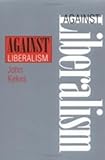Against Liberalism / John Kekes.
Material type: TextPublisher: Ithaca, NY : Cornell University Press, [2018]Copyright date: ©1999Description: 1 online resource (256 p.)Content type:
TextPublisher: Ithaca, NY : Cornell University Press, [2018]Copyright date: ©1999Description: 1 online resource (256 p.)Content type: - 9781501721878
- 320.51 21
- JC574 .K44 1997
- online - DeGruyter
| Item type | Current library | Call number | URL | Status | Notes | Barcode | |
|---|---|---|---|---|---|---|---|
 eBook
eBook
|
Biblioteca "Angelicum" Pont. Univ. S.Tommaso d'Aquino Nuvola online | online - DeGruyter (Browse shelf(Opens below)) | Online access | Not for loan (Accesso limitato) | Accesso per gli utenti autorizzati / Access for authorized users | (dgr)9781501721878 |
Browsing Biblioteca "Angelicum" Pont. Univ. S.Tommaso d'Aquino shelves, Shelving location: Nuvola online Close shelf browser (Hides shelf browser)

|

|

|

|

|

|

|
||
| online - DeGruyter Renaissance Feminism : Literary Texts and Political Models / | online - DeGruyter Narrative Transvestism : Rhetoric and Gender in the Eighteenth-Century English Novel / | online - DeGruyter Moral Wisdom and Good Lives / | online - DeGruyter Against Liberalism / | online - DeGruyter A Case for Conservatism / | online - DeGruyter Pluralism in Philosophy : Changing the Subject / | online - DeGruyter The Art of Life / |
Frontmatter -- Contents -- Preface -- CHAPTER 1. What Is Liberalism? -- CHAPTER 2. The Prevalence of Evil -- CHAPTER 3. Individual Responsibility -- CHAPTER 4. Collective Responsibility -- CHAPTER 5. The Errors of Egalitarianism -- CHAPTER 6. Justice and Desert -- CHAPTER 7. justice without the Liberal Faith -- CHAPTER 8. Pluralism versus Liberalism -- CHAPTER 9. The Sentimentalism of Benevolence -- CHAPTER 10. What Is Wrong with Liberalism? -- Afterword -- Notes -- Works Cited -- Index
restricted access online access with authorization star
http://purl.org/coar/access_right/c_16ec
Liberalism is doomed to failure, John Kekes argues in this penetrating criticism of its basic assumptions. Liberals favor individual autonomy, a wide plurality of choices, and equal rights and resources, seeing them as essential for good lives. They oppose such evils as selfishness, intolerance, cruelty, and greed. Yet the more autonomy, equality, and pluralism there is, Kekes contends, the greater is the scope for evil. According to Kekes, liberalism is inconsistent because the conditions liberals regard as essential for good lives actually foster the very evils liberals want to avoid, and avoiding those evils depends on conditions contrary to the ones liberals favor.Kekes argues further that the liberal conceptions of equality, justice, and pluralism require treating good and evil people with equal respect, distributing resources without regard to what recipients deserve, and restricting choices to those that conform to liberal preconceptions. All these policies are detrimental to good lives. Kekes concludes that liberalism cannot cope with the prevalence of evil, that it is vitiated by inconsistent commitments, and that—contrary to its aim—liberalism is an obstacle to good lives.
Mode of access: Internet via World Wide Web.
In English.
Description based on online resource; title from PDF title page (publisher's Web site, viewed 26. Apr 2024)


